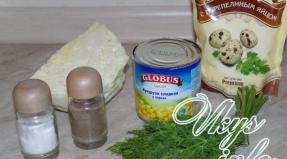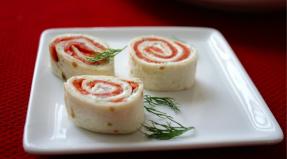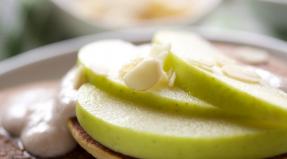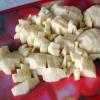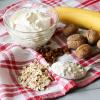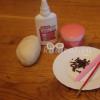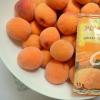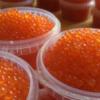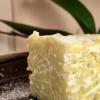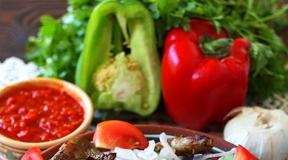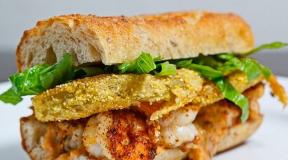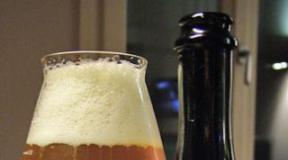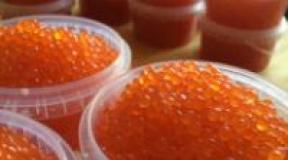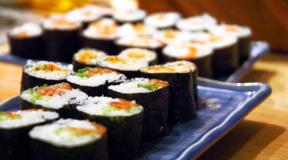What are the beneficial properties of apricot kernels and are there any contraindications: basic facts about bitter kernels. Can you eat watermelon with seeds? Useful properties and harm of watermelon seeds
How harmful are fruit pips? What processes occur in the body when we accidentally eat a bone? These and many other questions regarding fruit seeds are asked by most people. It's time to quell your curiosity and find out if bones can be eaten, and in what form.
Chief Editor
It often happens that, carried away by juicy grapes or a ripe apple, chewing the fruit avidly, we do not even notice how we eat the seeds of the fruit. Of course, if your favorite fruit is, say, a peach, it’s hard enough to imagine that you are quietly eating its huge bone, which in size would be quite similar to an independent fruit.
Children often deliberately get carried away with bones. And we, as caring mothers, cannot ignore this fact. However, in most cases, the only thing to really worry about is that the child might choke. For the rest, if the bones are not included in your usual daily diet, there will be no global harm.
General information about useful and harmful substances of seeds and seeds
Many are convinced that fruit pits and seeds are the custodians of valuable substances. Therefore, often the composition of creams and other cosmetics contains peach and apricot kernel oils... Nutritionists have noted the excellent properties of grape seed oil. And Old Believers, when cooking jams, do not separate the fruit from the stone and seeds in order to preserve the maximum amount of useful properties.
However, the valuable substances of the bones, which many like to talk about so much, are a rather controversial issue.
On the one hand, the nuclei of most plants of the genus plums contain a substance hazardous to health - the glycoside amygdalin. Breaking down in the stomach, it secretes hydrocyanic acid, which is known to be a poison. Now you know why apple seeds are so bitter, although the concentration of toxic substances in them is very low. On the other hand, apple seeds contain many minerals and vitamins... And most importantly - iodine. However, this does not mean that now you can absorb tons of bones, the daily rate is no more than 5-6 pieces.
The situation with other fruits is also contradictory.
Grapes and pomegranate

Often enjoying grapes or pomegranates, we swallow the seeds without chewing. This is fundamentally wrong because poorly chewed seeds of these fruits are not digested at all in the gastrointestinal tract... But at the same time, they contribute to the strengthening of peristalsis, acting like fiber. As noted earlier, grape seeds have excellent properties due to their many vitamins and phenolic compounds, which are very powerful antioxidants. In order for these substances to be well absorbed, you should not chew handfuls of grape seeds, it is best to make tinctures from them.
Pomegranate kernels are rich in vitamin E and fatty acids. However, they are recommended only for those who do not complain of diseases of the gastrointestinal tract. Otherwise, you can easily and simply earn an aggravation.

It is unlikely that among the readers there are lovers of cherry pits. However, very often it is swallowed quite by accident. In this case, we can do without panic and hysterics, despite the content of hydrocyanic acid in it, 1-2 bones eaten are not dangerous. You can perfectly calmly cook cherry jam with pits: high temperature destroys amygdalin... It is not for nothing that in French cuisine there is a very exquisite dessert clafoutis with cherries and cherries, the kernels from which are not removed during cooking.

Peach pits are bitter and inedible. Despite the fact that they are very hard, with a special desire, you can bite through them and stumble on kernels, which contain a large amount of amygdalin... So I advise you to believe in words and forget about the idea of trying to bite through a peach bone. In addition, it can be very bad for your teeth.
But peach seed oil is very useful because saturated with omega-3, omega-6 and omega-9 fatty acids. And as noted above, dangerous hydrocyanic acid is the result of the interaction of amygdalin with water, not fat. Therefore, you can safely add peach seed oil to salad dressings, for example.
Juicy and aromatic apricots are loved by both adults and children. These fruits are eaten fresh, fragrant jam and delicious compotes are cooked. Many people, having tasted the fruit, take a hammer and break the bones. In the middle of the thick rind is a tasty kernel that is eaten. But not everyone knows whether it is possible to eat apricot pits, as well as what benefits and harms this product can bring. You can eat apricot kernels, since the composition contains many vitamins and minerals that a person needs. Even physicians believe that when consumed in moderation, they have a beneficial effect on the body. The main thing here is not to neglect contraindications and to know a sense of proportion.
What substances are in the nucleoli
 Apricot seeds have an unusual taste, their health benefits were discovered by Chinese healers many years ago. The healing composition of the kernels is used to treat certain joint diseases and skin diseases.... Quite often, apricot kernels are added to cosmetic products - creams, scrubs, masks, shampoos and hair balms.
Apricot seeds have an unusual taste, their health benefits were discovered by Chinese healers many years ago. The healing composition of the kernels is used to treat certain joint diseases and skin diseases.... Quite often, apricot kernels are added to cosmetic products - creams, scrubs, masks, shampoos and hair balms.
The nucleoli contain such substances useful for humans:
- proteins, fats and carbohydrates;
- phosphorus, potassium, calcium and iron;
- special pigments of natural origin, as well as essential oils;
- a complex of vitamins A, B, C and PP;
- a small amount of hydrocyanic acid.
The kernel of an apricot kernel is quite nutritious, if you eat a handful of such seeds, then it is quite possible to satisfy your hunger. It is good to take such products with you on long trips or to work. The nucleoli help to improve brain activity and tone up the entire body well.
Dried apricot kernels taste a bit like almonds, so they can be used for confectionery.
The benefits of nucleoli for the body
 Apricot kernels are unique in their composition and can be used to treat certain diseases. In the course of research it was revealed that if you eat them regularly, then immunity increases and a person is less likely to get sick... With the consumption of a moderate amount of such nuts, positive changes occur in the body:
Apricot kernels are unique in their composition and can be used to treat certain diseases. In the course of research it was revealed that if you eat them regularly, then immunity increases and a person is less likely to get sick... With the consumption of a moderate amount of such nuts, positive changes occur in the body:
- The work of the heart muscle is activated, due to which the heart begins to work better.
- The development of oncological diseases is prevented.
- The cells of the body are quickly regenerated - this contributes to the prolongation of youth.
- The work of the intestines is normalized, the problem of constipation disappears.
- The peristatics of the intestinal walls significantly improves, the normal microflora is restored.
- The immune system is strengthened.
The nucleoli contain tocopherol, which prevents premature aging.
Acids of natural origin also have a beneficial effect on the human body. They act well on the cells of the epidermis, thereby improving the condition of the skin and, as a result, the appearance of a person.
Apricot seeds can be recommended to everyone in compliance with the measure... This product is especially actively consumed in the summer, when the fruits are ripe. They are eaten both raw and dried. To prepare an unusual delicacy, it is enough to hold the nucleoli in the oven for about 5 minutes. If necessary, apricot seeds can be added to confectionery or jam. Many housewives cook apricot jam with the addition of kernels, due to this, the final product comes out fragrant and very tasty.
Stories from our readers
Vladimir
61 years
I clean the vessels consistently every year. I started doing this when I turned 30, because the pressure was not to hell. Doctors only shrugged their hands. I had to take care of my health myself. I tried different methods, but one helps me especially well ...
Read more >>>
What harm can bones do
 Apricot pits can be consumed only in moderation, without much fanaticism. In the composition of the product there are some substances that, when excessively ingested into the body, cause poisoning.
Apricot pits can be consumed only in moderation, without much fanaticism. In the composition of the product there are some substances that, when excessively ingested into the body, cause poisoning.
When the kernel of the apricot kernel enters the stomach, amygdalin begins to be released from it, which, when decomposed, releases hydrocyanic acid. With excessive consumption of nucleoli, severe intoxication can occur. The maximum permissible dosage of apricot kernels for a person is 40 grams of product per day. The main thing is that the seeds are not old, as in this case the risk of poisoning increases.
To minimize the risk of poisoning with apricot kernels, you should first dry them in the oven for several minutes.
Contraindications
 Apricot seeds can be harmful to health in such cases:
Apricot seeds can be harmful to health in such cases:
- If a person has diabetes of any type.
- During pregnancy and lactation, in the event that the consumption of the product is excessive.
- With diseases of the thyroid gland.
- For chronic liver diseases.
- With a tendency to allergic reactions.
During pregnancy and lactation, the permitted volume of nucleoli is no more than 20 grams per day. Young children can eat the same amount of nuts if they are not allergic.
When poisoning is possible
 Intoxication is possible if a person has eaten more than 40 grams of apricot seeds per day... Signs of poisoning can appear after just a few minutes or a few hours after excessive consumption of the product. The main symptoms of poisoning look like this:
Intoxication is possible if a person has eaten more than 40 grams of apricot seeds per day... Signs of poisoning can appear after just a few minutes or a few hours after excessive consumption of the product. The main symptoms of poisoning look like this:
- severe weakness and drowsiness;
- cutting pains in the stomach and vomiting;
- persistent headache radiating to the back of the head;
- breathing disorder;
- fainting and convulsions.
If the above symptoms appear after eating the bones, it is necessary to drink an adsorbent in a therapeutic dosage, and then consult a doctor... In some cases, a person's condition can be very serious, then they urgently call an ambulance.
The healing properties of the nucleoli
 The benefits and harms of apricot seeds have not yet been fully understood. Nucleoli can be found in some traditional medicine recipes. They are used in different forms and for different needs:
The benefits and harms of apricot seeds have not yet been fully understood. Nucleoli can be found in some traditional medicine recipes. They are used in different forms and for different needs:
- Aqueous tinctures and decoctions are often used to treat prolonged coughs or bronchial asthma. Besides, they are recommended for people who suffer from heart disease.
- Apricot kernel oil helps restore vascular elasticity and reduces the risk of heart failure.
- The oil helps to get rid of constipation, it helps to gently remove toxins and toxins from the body.
- Apricot kernel oil is successfully used to treat gastritis and ulcers of the digestive organs.
- The healing oil helps prevent hemorrhoids.
Such plant raw materials are actively used in cosmetology., and for the manufacture of scrubs, not only kernel kernels are used, but also crushed shells.
Is it possible to eat kernels from apricots
Apricots are dried apricots with seeds... This product is consumed independently, used for the preparation of confectionery and second courses.
Apricot seeds can also be broken with a hammer and aromatic kernels can be extracted; they are allowed to be eaten in the same quantity as fresh apricot kernels.
Some housewives specifically buy not dried apricots, but apricots to complement the dish with delicious nuts.
Is it possible to gain weight from apricot kernels
 If you constantly eat the kernels from apricots in food, you can gain weight... This is not surprising, because the energy value of the product is quite high. Only 100 grams of nuts contain 510 Kcal, so it is recommended to eat them in a very limited amount for those people who are overweight or follow a diet.
If you constantly eat the kernels from apricots in food, you can gain weight... This is not surprising, because the energy value of the product is quite high. Only 100 grams of nuts contain 510 Kcal, so it is recommended to eat them in a very limited amount for those people who are overweight or follow a diet.
People who, on the contrary, suffer from a lack of mass, should eat such a product. It's good if he is in the diet all the time. Do not forget that in the composition of such nuts, in addition to nutrients, there are minerals and a complex of vitamins, so they need to be consumed by people after long-term illnesses, as well as with constant mental stress.
We can say that the question of whether it is possible to eat apricot kernels has been settled. They not only can, but also need to be eaten, but only in limited quantities. There are very few contraindications to their use, so they must be included in the diet of not only adults, but also young children. It is better not to eat the grains that have remained in stocks since last summer, so as not to get poisoned.... But it is also impractical to throw them away, from such a product you will get an excellent cosmetic product, it is enough to grind them and add them to your favorite cream.
Apricot pits: useful properties and harmThe kernels, which are in the pits of the apricot, do not have a pronounced taste. Especially appreciated is the oil that is part of their composition. Although fried kernels are very tasty and satisfying. We will try to understand why apricot pits are useful, and what damage they can cause to the human body in large doses.
For some reason, many of us believe that apricot seeds are very toxic and have a detrimental effect on our body. But in many southern countries, for example, in Uzbekistan, they are considered a traditional dish. Apricot jam with pits is also a real delicacy.
Useful components of the bone
The nuclei contain many substances. One of them is a very rare vitamin B 17 or amygdalin, the value of which in the fight against cancer cells is invaluable. Upon contact with a malignant tumor, poisons are released - cyanide and benzaldehyde, which are contained in the bones. Thus, they gradually destroy cancer. For a healthy body, these substances in such small doses are quite safe.
Also, 100 g of seeds contain:
- fats -45 g;
- carbohydrates - 4 g;
- proteins - 25 g;
- unsaturated fatty acids - 40 mg;
- saturated fatty acids - 3 g;
- PP vitamins - 4 mg;
- macronutrients (potassium, magnesium, calcium, sodium, phosphorus) - 12 mg;
- trace elements (iron) - 7 mg.
The calorie content of apricot kernels is 450 calories (per 100 g), so they are contraindicated for people on a diet.
Apricot kernels are eaten raw, fried and dried, in a recommended dose of 20 g at a time. Seeds are used in many industries: food, light, medical.
The benefits of apricot kernels
Apricot kernels are very nutritious and contain a large amount of vegetable oil, so they are great for the daily diet of athletes and people trying to gain weight.
The healing properties of apricot seeds were discovered many millennia ago. So in ancient China they were used to heal the skin and joints. Today, thanks to the development of medicine, bones are used for the manufacture of medicines and cosmetics, as well as for the treatment and prevention of many diseases.
Apricot seeds, brewed like tea, are an excellent remedy for cardiac arrhythmias. Also, on their basis, you can prepare an excellent medicine for cardiovascular diseases. It is prepared according to an old recipe:
- 0.5 kg of lemon is chopped in a meat grinder or grater;
- add 20 detailed apricot kernels;
- the resulting gruel is poured into 0.5 l of honey;
- mix thoroughly and insist for 2-3 days in a cool place;
- take medicine in the morning and in the evening for 1 tbsp. l.
Almond milk, extracted from apricot seeds, has an antitussive effect and is used in the treatment of diseases of the upper and lower respiratory tract, as well as the kidneys and liver.
Harm of apricot kernels
In doses not exceeding 20 g (approximately 5 kernels) for adults and 10 g for children, apricot pits are absolutely harmless. But if you exceed the recommended limit, it can lead to poor health (nausea, dizziness). This property is associated with the presence of poison - cyanide, which in small quantities has a detrimental effect on cancer cells, and in large quantities - on healthy ones.
Too bitter bones are no less harmful, and not only because of the unpleasant taste, but due to the large accumulation of amygdalin. Although there are such types of apricots, the tassels of which have a pleasant sweetish aftertaste. In recent years, breeders have been actively involved in breeding varieties with a minimum amygdalin capacity and a maximum kernel size.
Apricot pits in cosmetology and cooking
Everyone knows how to grow an apricot from a stone, but not everyone knows that with their help you can prolong life, preserve youth and prepare delicious and aromatic food.
The long-livers of the planet - the Indian tribe of Khuza, eat exclusively vegetarian food, and one of the main dishes of their menu is apricots along with a stone. Surprisingly, according to scientists, the Hunza people have lived for so long (about 120 years) precisely because of the seeds.
Apricot kernel oil obtained by cold pressing is used for the preparation of various cosmetics (shampoos, balms, masks, etc.). It is also famous for its moisturizing and warming qualities, so professional massage therapists use it for health treatments.
Apricot pits, the benefits and harms of which, of course, are important for cooking, since they are added to ice cream, glazes, creams, waffles, desserts and other dishes, they have a persistent almond aroma. It gives preservation and baking notes of sophistication and unusual taste.
Outcome
Using apricot seeds, the benefits and harms of which have been studied by experts, you will get rid of many diseases, heal your skin and prepare delicious and aromatic delicacies.
Pomegranate seeds, the benefits and harms of which have long been the subject of controversy among scientists, have a number of unique properties that can have a beneficial effect on the human body.
There is also an opposite opinion that pomegranate seeds are not suitable for food: if they enter the intestine, they clog it, cause inflammation of the appendage of the cecum. Is it really?
Useful composition
Pomegranate is an exotic fruit. The majority of consumers evaluate only the taste of the fruit, exclude pomegranate seeds from food, fearing the harmful effects of the solid structure of the seeds on the gastrointestinal tract.
The granular part of the fruit contains useful minerals, vitamins, polyunsaturated acids. Healing oils are extracted from pomegranate seeds, which are used in dermatology, therapy, cosmetology. Pomegranate seed oil contains linoleic, palmitic, oleic and stearic acids.
Composition of pomegranate seeds:
- vitamins of group A, B, E;
- trace elements: calcium, potassium, sodium;
- a nicotinic acid;
- phosphorus compounds;
- fatty acid;
- polyphenols;
- iron.
Also the seeds include: tannins, iodine, starch and ash. The benefits of pomegranate seeds have been proven by numerous medical studies. The positive properties of seeds are widely used for the treatment of various diseases, the solution of cosmetic problems, the preparation of medicines and alcoholic tinctures.
Useful properties of pomegranate seeds
 Often when the fruit is eaten, pomegranate seeds are swallowed along with the pulp. Are the bones of the fetus useful for the body or their presence in the intestines threatens characteristic consequences? Scientific research has shown that granular pomegranate pulp has a positive effect on the health of patients with various ailments, since pomegranate seeds:
Often when the fruit is eaten, pomegranate seeds are swallowed along with the pulp. Are the bones of the fetus useful for the body or their presence in the intestines threatens characteristic consequences? Scientific research has shown that granular pomegranate pulp has a positive effect on the health of patients with various ailments, since pomegranate seeds:
- have an anti-inflammatory effect;
- cleanse the body of toxins and toxins;
- eliminate the symptoms of diarrhea;
- relieve headaches;
- contribute to the regulation of metabolic processes in the body;
- stabilize the work of the endocrine glands;
- reduce pain during menstruation;
- have a beneficial effect on the sexual function of men.
Pomegranate seeds are useful in reducing the level of hemoglobin in the blood, hypertension, sleep disorders, depression, skin diseases. The granular fruit is recommended for people with diabetes mellitus, as an additional remedy in the treatment of helminthic invasions, for women during gestation and during menopause.
The mucous membrane of the gastrointestinal tract becomes inflamed under the influence of harmful substances: alcoholic beverages, coffee, chocolates and other food irritants. Pomegranate seeds contain tannin, a tannin that promotes the formation of a protective layer on the mucous membrane from the precipitated protein of tissue cells. Tannin slows down intestinal motility, leads to the formation of gas, impaired bowel movements due to the compaction of intestinal contents
Doctors advise eating pomegranate seeds for the treatment of diseases of the genitourinary system. According to statistics: regular consumption of pomegranate seeds prevents the risk of breast cancer in women; prostate adenomas - in men.
To eat or not to eat
 Pomegranate seeds are composed of resistant starch, polysaccharides and cellulose, which together provide complex carbohydrates. Digestive enzymes are sometimes unable to digest completely tough fiber, but it is processed by the beneficial microflora of the intestinal tract.
Pomegranate seeds are composed of resistant starch, polysaccharides and cellulose, which together provide complex carbohydrates. Digestive enzymes are sometimes unable to digest completely tough fiber, but it is processed by the beneficial microflora of the intestinal tract.
Is it okay to eat pomegranate seeds with seeds? The fruits of different varieties of pomegranate trees differ from each other: some varieties contain small seeds inside that have a soft texture, or vice versa, the seeds are large and have a hard shell. When chewing large grains, there is a risk of damage to the tooth enamel.
You can eat fruit with seeds if:
- grains have a soft texture;
- there are no diseases of the oral mucosa,
- there are no contraindications for use.
To improve the absorption of nutrients found in pomegranate seeds, it is recommended to thoroughly chew the fruit pulp together with the seeds. An alternative way to use pomegranate seeds: dry the seeds, grind in a coffee grinder. Use as a dietary supplement.
How to eat pomegranate with seeds
 There are rules for cutting an exotic fruit, when the benefits of pomegranate seeds for the body remain unchanged. If the pomegranate is cut illiterately, the granular part of the fruit loses some of the nutrients. How to eat pomegranate with seeds correctly:
There are rules for cutting an exotic fruit, when the benefits of pomegranate seeds for the body remain unchanged. If the pomegranate is cut illiterately, the granular part of the fruit loses some of the nutrients. How to eat pomegranate with seeds correctly:
- Remove the inflorescence from the top of the pomegranate with a knife.
- Make shallow cuts from the cut of the inflorescence to the bottom of the fruit so that the stalk remains intact. Attention: it is recommended to make notches at the place of deepening of the slices. If juice is flowing from the notches, the fruit is cut incorrectly.
- Place the pomegranate on a horizontal surface, press on the top of the fruit with your hand: the slices should open in the form of petals.
- Separate a slice of pomegranate, eat the pulp together with the seeds, carefully chewing the juicy substance.
Pomegranate seed oil
 Pomegranate seed oil is produced by cold pressing. The oily liquid has a light texture, golden color, soft fruity aroma. To prepare 1 kg of butter, half a ton of raw materials is required.
Pomegranate seed oil is produced by cold pressing. The oily liquid has a light texture, golden color, soft fruity aroma. To prepare 1 kg of butter, half a ton of raw materials is required.
Pomegranate fatty acid is the main component of the oil. It also contains vitamin E, oleic acid, organic compounds, trace elements and other chemical compounds useful for the body.
Despite the fact that pomegranate seeds are useful, the beneficial properties of the oil are rated much higher. Their composition:
- softens the skin;
- has a rejuvenating effect;
- regulates the work of the sebaceous glands;
- promotes natural restoration of moisture in the epidermis;
- accelerates the process of restoring the barrier protection of the skin;
- accelerates the regeneration of damaged tissues.
Pomegranate seed oil is used for age-related changes in the skin, after prolonged exposure to the sun to prevent photoaging of the epidermis, whitening the face. The oil substance enhances the barrier function of the skin in adverse climatic conditions.
Pomegranate seed tincture
 Pomegranate grains contain more than ten amino acids, punicalagin, a complex of minerals that help lower blood cholesterol, strengthen the heart muscle and blood vessels.
Pomegranate grains contain more than ten amino acids, punicalagin, a complex of minerals that help lower blood cholesterol, strengthen the heart muscle and blood vessels.
You can make the tincture yourself at home. With regular use in prescribed doses, alcoholic tincture on pomegranate seeds is capable of:
- reduce the formation of cholesterol plaques on the walls of blood vessels;
- prevent respiratory diseases;
- relieve the symptoms of premenstrual syndrome;
- reduce foci of inflammation of various origins.
As an alcohol base, you can use alcohol, moonshine, vodka.
The recipe for the Kremlin star tincture:
Composition
- pomegranate - 5 pcs.;
- lemon - 1 pc.;
- cinnamon - 5 g;
- alcohol - 500 ml;
- granulated sugar - 350 g.
Preparation
- Prepare a container with water.
- Extract the seeds from the pomegranate. Divide the fruit into two parts, turn each half of the pomegranate inside out so that the seeds from the fruit fall into the water.
- Transfer the pomegranate seeds to a ceramic bowl or colander. Mash the grains with a mortar until juices form.
- Grind the lemon zest, mix with pomegranate seeds. Place the composition in a glass three-liter container.
- Add cinnamon to the mixture, pour the composition with alcohol.
An alcoholic drink on pomegranate seeds is infused for 20 days in a cool place. It is important to exclude sunlight on the container. To enhance the infusion process, it is recommended to shake the jar 2 - 3 times daily. After the time has elapsed, filter the tincture through cheesecloth.
For the prevention of diseases, improving well-being, it is recommended to use the tincture 1-2 times a day, 1 tbsp. l. before meals for two months. You can store an alcoholic drink on the side door of the refrigerator for no more than three months.
Are pomegranate seeds good for children
 It is good to eat pomegranate at any age. Parents often ask the question of whether it is possible for children to eat pomegranate seeds along with the pulp of the fruit. Doctors do not recommend doing this, due to the fact that in young children the gastrointestinal tract is not perfect. For this reason, it is not recommended to allow babies under the age of 1 year to eat pomegranate seeds. Until the age of two, parents must control the consumption of the fruit, extract seeds from the pulp.
It is good to eat pomegranate at any age. Parents often ask the question of whether it is possible for children to eat pomegranate seeds along with the pulp of the fruit. Doctors do not recommend doing this, due to the fact that in young children the gastrointestinal tract is not perfect. For this reason, it is not recommended to allow babies under the age of 1 year to eat pomegranate seeds. Until the age of two, parents must control the consumption of the fruit, extract seeds from the pulp.
Pomegranate seeds are indicated for use by children for the prevention and treatment of anemia. As an antibacterial agent, it is recommended to use a solution of pomegranate powder for rinsing the throat and mouth for stomatitis. To do this, grind dry pomegranate grains into powder, pour hot water over the composition. Boil the solution, leave for 30 minutes.
By the age of three, the child's bowel function is stabilized. The kid can eat pomegranate seeds, chewing thoroughly, 2 - 3 things at a time.
If necessary, the seeds can be ground in a coffee grinder, pomegranate powder can be added to milk or honey.
The positive properties of pomegranate seeds during pregnancy
 During gestation, a woman's body is deficient in riboflavin, tocopherol, nicotinic and ascorbic acid, as well as important trace elements involved in laying the organs and tissues of the future baby. The pomegranate contains a large amount of nutrients that are beneficial to the body of the mother and child. Pregnant women are advised to eat pomegranate fruits two to three times a week. Can you eat pomegranate seeds during pregnancy? - a question of interest to expectant mothers.
During gestation, a woman's body is deficient in riboflavin, tocopherol, nicotinic and ascorbic acid, as well as important trace elements involved in laying the organs and tissues of the future baby. The pomegranate contains a large amount of nutrients that are beneficial to the body of the mother and child. Pregnant women are advised to eat pomegranate fruits two to three times a week. Can you eat pomegranate seeds during pregnancy? - a question of interest to expectant mothers.
In the absence of allergic reactions, individual intolerance, doctors do not prohibit eating pomegranate seeds. While bearing the fruit of the pomegranate seed:
- strengthen the walls of blood vessels;
- increase the body's defenses during flu epidemics;
- make up for the lack of vitamins in a woman's body;
- reduce the phenomena of toxicosis in the first and third trimester of pregnancy;
- reduce puffiness.
After the birth of the baby, the mother can eat pomegranate seeds in the absence of allergies in the newborn. When breastfeeding, the mother is recommended to eat no more than five grains, gradually increasing the number of seeds to twenty pieces.
Harmful effects of pomegranate seeds: contraindications
 Popular wisdom says: "A medicine is beneficial if its dosage is observed." Excessive consumption of pomegranate seeds can cause negative effects on the body. It is not recommended to eat pomegranate seeds more than once a day.
Popular wisdom says: "A medicine is beneficial if its dosage is observed." Excessive consumption of pomegranate seeds can cause negative effects on the body. It is not recommended to eat pomegranate seeds more than once a day.
You can eat pomegranate seeds if there are no contraindications:
- diseases of the stomach and intestinal tract;
- gastritis with high acidity;
- hypotension;
- constipation, increased gas production;
- colitis;
- haemorrhoids.
Pomegranate seeds are contraindicated for people with a tendency to constipation.
No similar news
Many people believe that fruit pits and seeds contain valuable substances - it is not for nothing that apricot and peach kernel oils are so appreciated by cosmetologists, and nutritionists extol the wonderful properties of grape seed oil. Of course, few people dare to eat a whole peach, but often for reasons of benefit, for example, they make jam without extracting seeds from fruits and berries.
It turns out that the benefits of fruit seeds are controversial. Firstly, the kernels of many plants of the plum genus contain a substance that is hazardous to health: "The kernels of the kernels of apricots, peaches, apples, cherries contain the glycoside amygdalin, which is split in the stomach with the release of hydrocyanic acid, which is a poison," explains Irina Russ, nutritionist. endocrinologist at the European Medical Center. It is amygdalin that gives apple seeds a bitter taste. Of course, the concentration of toxic substances in them is very low, but this fact should not be neglected. “At the same time, apple seeds are a source of many vitamins, minerals, and most importantly, iodine,” says Irina Russ, “however, you can eat no more than five or six of them a day.”
The situation with other bones is also controversial.
Grapes and pomegranate

“Pomegranate and grape seeds, if not chewed, are not digested in the gastrointestinal tract, but they can enhance peristalsis, acting like fiber,” says Irina Russ. In addition, grape seed contains many vitamins and plant phenolic compounds - very powerful antioxidants. True, if you just chew the bones, these substances will not be absorbed too well - it is much more useful to make tinctures. Pomegranate kernels contain a lot of unsaturated fatty acids and vitamin E.

However, you can eat these seeds only if you do not have diseases of the gastrointestinal tract, otherwise they can cause an aggravation. In addition, take care of the enamel of your teeth: hard bones are also not useful for it.
Cherry

You can probably swallow a cherry pit only by accident: hardly anyone will deliberately eat something absolutely inedible. However, if this happens, you should not panic: despite the content of hydrocyanic acid, a small amount of bones are not dangerous.
You can also cook cherry jam without removing the pits completely calmly: under the influence of high temperatures, the amygdalin is destroyed. For the same reason, there is no need to be afraid to do with cherries the way the French do it, without taking out the kernel.
Peach

Peach kernel kernels are difficult to get, and if you manage to do it, you will find that they are completely tasteless. Due to the high content of amygdalin, they taste bitter, so you really don't need to eat them. Another thing is peach seed oil. It is rich in omega-3, omega-6, and omega-9 polyunsaturated fatty acids, and since amygdalin is water soluble but not fat, there is no hydrocyanic acid in the oil and can be added to salad dressings.
Apricot

The most edible bone is insidious: in addition to polyunsaturated fatty acids, minerals and vitamins, it also contains the notorious hydrocyanic acid. Eating more than ten delicious nucleoli is not worth it.
On the other hand, heat treatment makes apricot kernel kernels completely harmless, which is why they are so often used in the cuisine of the Caucasus and the Middle East: it is enough to ignite the kernels in the oven - and you can mix with honey and dried apricots or eat just like that. And Europeans also found a way to use apricot pits: bitter kernels are used to flavor jams and fondants (two or three kernels are enough) or to make Italian amaretti cookies.
Read also ...
- Chicken liver pate
- Delicious zucchini with cheese in sour cream in the oven - a step by step recipe with video Zucchini recipes in the oven with sour cream
- Banana rice and corn flour pancakes (gluten free) with homemade banana sauce Banana pancakes with semolina
- Cabbage casserole with chicken Chicken fillet casserole with cabbage
